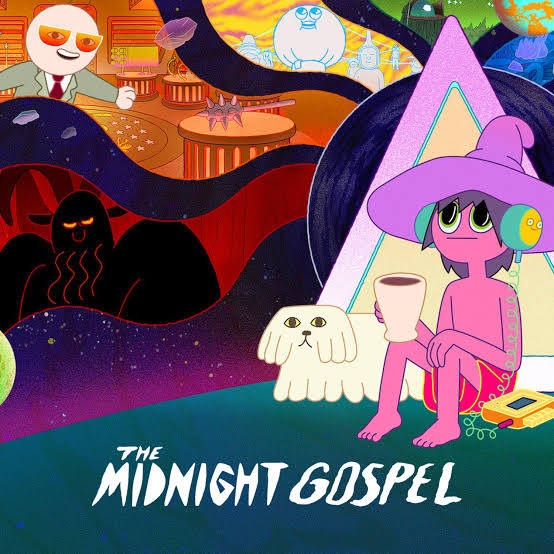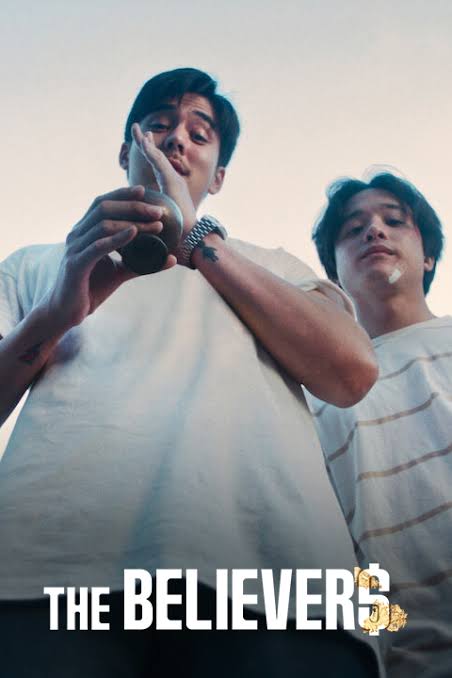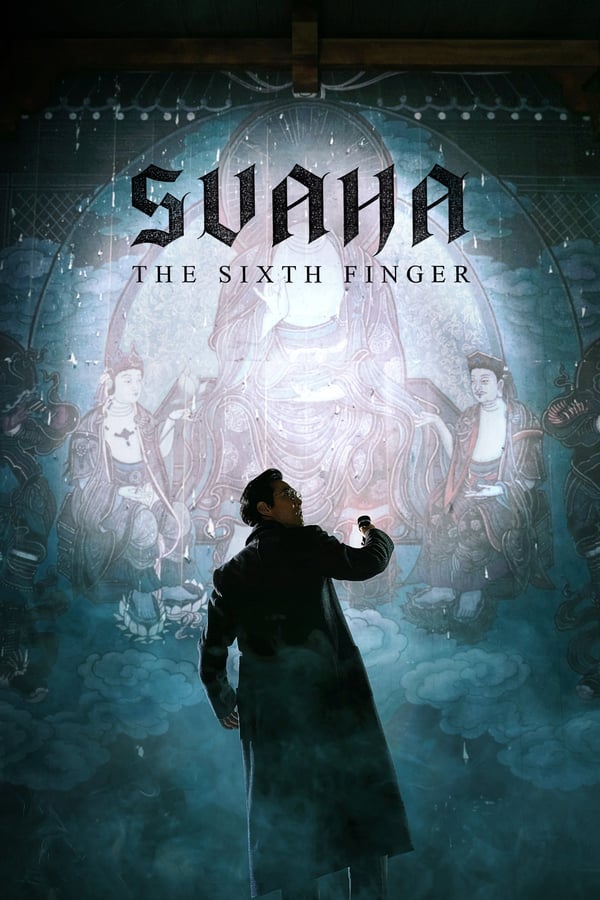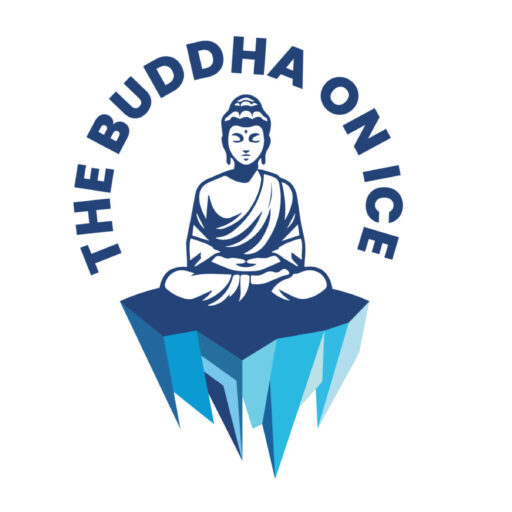In today’s modern world there are an endless number of ways to absorb the Dharma. There are the classic ways: attending services at your local temple or reading sutras. Conversely, there are more contemporary ways, such as listening to a podcast while hitting the gym or kicking back on the couch watching some Netflix. We’ve assembled a list of the best Buddhist themed shows and movies on Netflix to help you absorb the Dharma while simultaneously keeping you entertained. Forget Neflix and chill, choose a show from the list below and get ready for Netflix and Chan(Buddhism)!
The Midnight Gospel

Trippy, mind-bending, consciousness-expanding. There’s no shortage of psychedelic adjectives one can use to describe The Midnight Gospel. It’s everything that non-buddhists think should happen during a meditation session or enlightenment. Watching the show is the equivalent of trying to solve a visual Koan.
The series follows Clancy Gilroy, a “spacecaster”, aka a “space podcaster”, who travels to bizarre simulated universes via a device called a multiverse simulator. Each episode features Gilroy interviewing a different spiritual teacher, philosopher, or author from a different universe. Fans of the “Duncan Trussell Family Hour” will be delighted to learn each episode of The Midnight Gospel features audio from the real-world podcast.
The show doesn’t directly preach Buddhism, but it weaves Buddhist themes—such as Samsara and Suffering (Dukkha), Non-Self (Anatta), and Compassion and Loving-Kindness (Metta)—through the phantasmagoric storylines of each episode. The entire arc of the show parallels an individuals journey toward enlightenment. Clancy starts off seeking external stimulation from the multiverse simulator but gradually begins to turn inward. By the final episode, there’s a noticeable shift toward acceptance, peace, and letting go.
The Believers

The Believers dives headfirst into the darker side of organized religion and human nature. The show follows three main characters, Win, Dear, and Game, as they leverage Buddhism and faith in general as a means to recover from their failed NFT gaming business. Produced as a Thai original Netflix series, The Believers intertwines crime, drama, and satire to explore the commercialization of Thai Buddhism.
In a desperate attempt to recover from the massive debt they accrued from their NFT business, they devise a plan to renovate an abandoned Buddhist temple. They transform the dilapidated temple into a profitable enterprise by capitalizing on people’s faith and donations.
The show doesn’t directly preach Buddhist beliefs. It instead takes a macro view of the commodification of faith and religion by weaving Buddhist practices and traditions into a thrilling storyline and the societal impacts nefarious religious leaders can use against the general public. Buddhism is about seeing truth and reality for what it is. The Believers delivers on this core tenant by inviting viewers to look deeply into their own faith and organized religion around the world.
Russian Doll

Samsara and the Cycle of Suffering. Impermanence and Non-Self. Interdependence and Compassion. Russian Doll delivers teachings on these core Buddhist beliefs via the perspective of Nadia, a software engineer from New York City. Nadia finds herself trapped in a time loop, a la Bill Murray’s “Groundhog Day“, forced to relive her 36th birthday over and over again.
The storyline serves as a metaphor for the Buddhist concept of samsara, the cyclical nature of birth, death, and rebirth, driven by ignorance and desire. Each “new” day forces Nadia to confront her past traumas, relationships, and choices. Serving as a powerful metaphor for the journey toward enlightenment through self-awareness and transformation.
Although the show isn’t specifcally buddhist, we still have it on our list of best Buddhist shows on Netflix because of the underlying themes. Nadia’s repeated deaths and rebirths highlight the futility of escaping suffering without inner change and the Eightfold Path. She learns about Impermanence and anatta through experiences that challenge her idea of a fixed self. Interdependence and Compassion are introduced via another character, Alan, who is caught in a similar loop. Although the show never directly addresses these Buddhist teachings, Buddhist practitioners and students of the Dharma will recognize the storyline as a powerful allegory for them.
See You in My 19th Life

Reincarnation. It’s one of the most well-known Buddhist beliefs. See You In My 19th Life is a Korean Drama that tackles the subject with charm, comedy and an eclectic cast of lovable characters. The storyline also blends in other Buddhist beliefs, including Karma and Cause and Effect, Anicca (Impermanence), and Anatta (Non-self).
Students of the Dharma may argue that the representation of reincarnation, or rebirth, presented in this show is more relevant to the Hindu concept, rather than the Buddhist variety. However, some Buddhist sects believe that individuals who have mastered the fourth meditative absorption will be able to recollect their past lives. Which we would argue is enough to make this show Buddhist, or at least Buddhist adjacent.
The show follows Ban Ji-eum, a woman that can remember all of her past lives and her quest to reconnect with a man she loved in her 18th life, which was tragically cut short. While rebirth is the main theme, Ji-eum has to navigate through feelings of attachment, non-self and Samsara in her mission to break free from the rebirth cycle that is causing her suffering.
Svaha: The Sixth Finger

Forget shaking in your boots, Svaha: The Sixth Finger will have you shaking in your traditional Buddhist monk wooden-soled clogs. Svaha: The Sixth Finger is a peculiar blend of Buddhist teachings, horror and crime investigation. This film is the most Buddhist-centric content on our list of best Buddhist shows on Netflix.
The film simultaneously follows Pastor Park, an investigator specializing in exposing religious cults and Geum-hwa, a woman separated from her twin sister who was locked away and accused of being a “monster”. Their stories intertwine as the story progresses and Pastor Park gets closer to solving the mystery of a suspicious Buddhist sect called Deer Mount.
Buddhist ideology is presented in twisted or corrupted forms as the Deer Mount sect leverages The Buddha‘s teachings for their own personal gain. Reincarnation and Prophecy, Karma and Retribution, Duality and Non-Dualism, and The Search for Truth are all present as Pastor Park works to uncover the secrets behind the mysterious sect.
Honorable Mention: Headspace Guide to Meditation

In spite of the fact that it’s not technically a “show” we had to include “Headspace Guide to Meditation” on our list of best Buddhist shows on Netflix. Headspace is one of the leading meditation and mindfulness apps in the United States. The Headspace Guide to Meditation offers a series of guided, breath-focused meditations that suit both seasoned practitioners and newcomers alike.
Each episode is approximately 20 minutes in length and walks viewers through several meditation topics ranging from how to deal with stress and anger to how to embrace gratitude and kindness. Users of the app will be familiar with the soothing voice of former Buddhist monk Andy Puddicombe while all viewers will be able to enjoy the whimsical animations that accompany the voiceover meditation walkthrough, should they choose to meditate with their eyes open.
This program is perfect for anyone with a Netflix subscription curious about Headspace or people looking for a quick nighttime meditation while winding-down on their couch at the end of the day.

